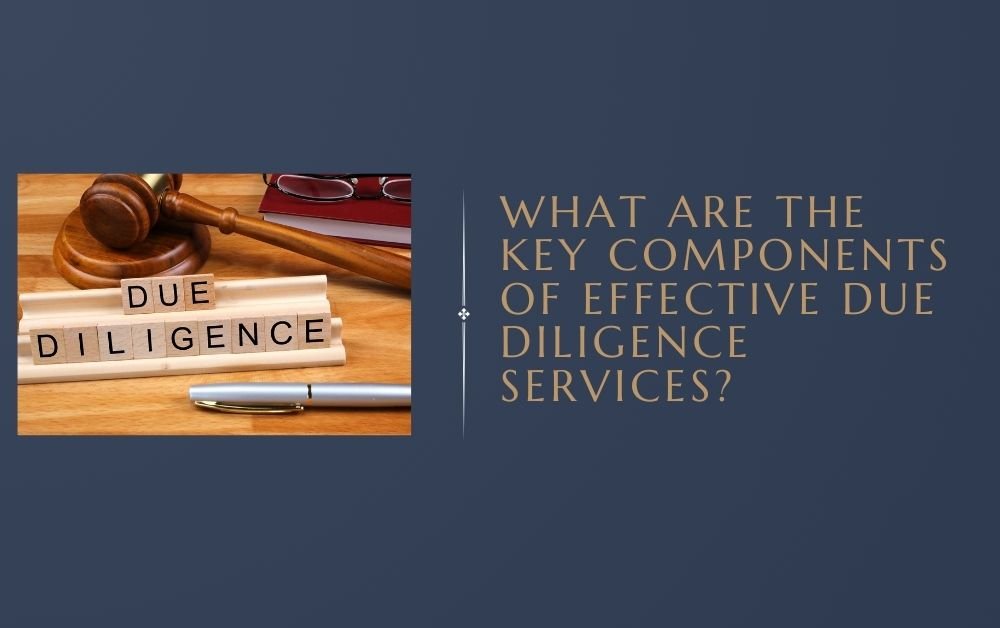Due diligence is a critical process used by businesses and investors to assess the risks and opportunities associated with a potential transaction, such as mergers, acquisitions, or partnerships. Effective due diligence services help ensure that all necessary information is gathered and analyzed, allowing decision-makers to make informed choices. But what exactly makes due diligence effective? In this blog, we’ll explore the key components of effective due diligence services and how they contribute to successful business transactions.
1. Financial Due Diligence
Understanding the Financial Health
One of the first and most important components of due diligence is assessing the financial health of the target company. Financial due diligence focuses on reviewing the company’s financial statements, tax records, and accounting practices. The goal is to understand how well the company has performed financially and whether there are any red flags that could affect its future success.
Note:– Need Reliable Due Diligence Services in Dubai? Contact O.G.M Consultants today! The expert team provides comprehensive Due Diligence Services tailored to your business needs. Whether you’re considering an investment, merger, or acquisition, They ensure that you have all the necessary information to make informed decisions. Don’t take risks with your investments—reach out now for a consultation and secure your business’s future!
Key Areas of Financial Due Diligence
- Revenue and profitability analysis: Examining income statements, cash flow, and profit margins to determine whether the company’s revenue and profits are sustainable.
- Debt and liabilities: Reviewing outstanding debts, liabilities, and any contingent liabilities that might not be reflected in the financial statements.
- Tax compliance: Ensuring that the company has complied with tax regulations and that there are no significant tax liabilities.
2. Legal Due Diligence
Assessing Legal Risks and Compliance
Legal due diligence focuses on uncovering any legal issues that might pose a risk to the transaction. This includes reviewing contracts, ongoing litigation, intellectual property rights, and regulatory compliance. The aim is to ensure that the company operates within the bounds of the law and that there are no hidden legal liabilities.
Key Areas of Legal Due Diligence
- Contracts and agreements: Analyzing key contracts, including those with suppliers, customers, and employees, to identify any obligations or risks.
- Ongoing litigation: Investigating any legal disputes or claims against the company that could result in financial loss or reputational damage.
- Regulatory compliance: Ensuring that the company complies with industry regulations, environmental laws, and other legal requirements.
3. Operational Due Diligence
Evaluating the Efficiency of Operations
Operational due diligence involves analyzing the company’s day-to-day operations to assess how efficiently it functions. This includes reviewing the company’s management team, supply chain, production processes, and overall business model. Effective operational due diligence identifies potential inefficiencies or risks that could impact the company’s ability to operate smoothly post-transaction.
Key Areas of Operational Due Diligence
- Management team: Evaluating the capabilities and experience of the company’s leadership to ensure they can manage the business effectively.
- Supply chain: Reviewing suppliers and logistics to identify any potential risks that could disrupt production or delivery.
- Business processes: Assessing whether the company’s processes are optimized for efficiency, productivity, and cost-effectiveness.
4. Commercial Due Diligence
Understanding the Market and Competitive Landscape
Commercial due diligence focuses on evaluating the company’s position in the market and its potential for future growth. This component involves analyzing the company’s competitors, market share, customer base, and overall industry trends. The goal is to determine whether the company’s business model is viable in the long term and whether it can remain competitive.
Key Areas of Commercial Due Diligence
- Market trends: Analyzing industry trends and potential market changes that could affect the company’s future growth.
- Competitive positioning: Assessing the company’s strengths and weaknesses relative to its competitors and identifying opportunities for improvement.
- Customer relationships: Reviewing the company’s relationships with key customers and their loyalty, which can be crucial for future sales.
5. Human Resources Due Diligence
Evaluating Employee and Management Structures
Human resources due diligence involves reviewing the company’s workforce, employment contracts, benefits, and overall employee satisfaction. This component is essential for identifying potential risks related to staff retention, labor disputes, or compliance with labor laws. Understanding the company’s human capital is crucial for a smooth transition and ensuring that the workforce remains engaged post-transaction.
Key Areas of Human Resources Due Diligence
- Employment contracts and policies: Ensuring that the company’s employment agreements are in line with local labor laws and regulations.
- Employee satisfaction and retention: Analyzing employee satisfaction and turnover rates to assess whether there are any workforce-related risks.
- Compensation and benefits: Reviewing employee compensation packages, benefits, and any long-term obligations such as pensions or retirement plans.
6. Technology Due Diligence
Assessing IT Systems and Infrastructure
In today’s digital age, technology plays a critical role in the success of a business. Technology due diligence focuses on evaluating the company’s IT infrastructure, software, and cybersecurity measures. This component helps identify any weaknesses in the company’s technology systems that could pose risks to operations or security.
Key Areas of Technology Due Diligence
- IT infrastructure: Evaluating the company’s hardware, software, and networks to ensure they are secure, scalable, and up-to-date.
- Cybersecurity: Assessing the company’s cybersecurity practices and identifying any vulnerabilities that could result in data breaches or cyber-attacks.
- Technology innovation: Reviewing the company’s technology strategy to determine whether it can keep up with technological advancements in the industry.
7. Environmental Due Diligence

Assessing Environmental Risks and Compliance
Environmental due diligence is essential for companies that operate in industries with significant environmental impacts, such as manufacturing, energy, or construction. This component involves reviewing the company’s compliance with environmental regulations, assessing its environmental footprint, and identifying any potential liabilities related to environmental risks.
Key Areas of Environmental Due Diligence
- Compliance with environmental regulations: Ensuring that the company complies with local and international environmental laws.
- Environmental impact: Evaluating the company’s environmental footprint, including waste management, emissions, and sustainability practices.
- Potential liabilities: Identifying any environmental risks, such as contamination or non-compliance, that could result in financial penalties or legal disputes.
8. Tax Due Diligence
Ensuring Proper Tax Practices and Compliance
Tax due diligence focuses on reviewing the company’s tax practices and ensuring compliance with local and international tax laws. This component helps identify any potential tax liabilities, such as unpaid taxes, incorrect filings, or tax disputes that could affect the transaction.
Key Areas of Tax Due Diligence
- Tax filings and compliance: Reviewing the company’s tax filings to ensure accuracy and compliance with tax regulations.
- Tax liabilities: Identifying any outstanding tax liabilities or disputes with tax authorities.
- Tax planning and strategies: Assessing the company’s tax strategies to determine whether they are sustainable and compliant with future tax regulations.
Conclusion
Effective due diligence is a comprehensive process that covers multiple aspects of a business. From financial and legal evaluations to operational, technological, and environmental assessments, each component provides valuable insights that help businesses make informed decisions. By working with experienced due diligence professionals, businesses can minimize risks, identify growth opportunities, and ensure the success of any potential transaction. Whether you are buying a business, merging with another company, or seeking investment, conducting thorough due diligence is a crucial step in the process.
Note:- To read more articles visit on iktimes.


